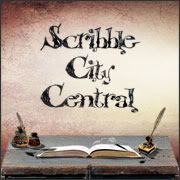 It is a fact that dogs (if you are a dog-lover and owner) worm themselves into your heart and your affections with ease. I have been around dogs all my life--labradors, spaniels, dandie dinmonts), but none of them have ever been 'mine', they have always been shared. Or at least that was the case till last April, when Sophy the Teckel Goddess entered my world.
It is a fact that dogs (if you are a dog-lover and owner) worm themselves into your heart and your affections with ease. I have been around dogs all my life--labradors, spaniels, dandie dinmonts), but none of them have ever been 'mine', they have always been shared. Or at least that was the case till last April, when Sophy the Teckel Goddess entered my world.I had always wanted a Teckel (and for those in ignorance of what a teckel is, it is a very large wire-haired dachshund, bred to hunt boar and deer). So it was with delight (and some trepidation) that I picked up a small and hairy puppy person from Hay-on-Wye. Naturally, I wanted a dog with literary connections. After all she was going to be the Writer's Dog. And indeed she was. She soon learned that the Little Red Bed under my desk was an excellent place for napping and chewing toes. Teaching her not to chew the computer cables was a more difficult task.
But what she loved most of all was to watch the starlings and the sparrows and the swallows, and to chase them round the garden, barking in a sort of joyous shriek of ecstasy which became the background soundtrack to my writing life. She was also, as all hounds are, an escape artist of enormous skill and cunning, and it was this that killed her in the end. Tunnelling under the carefully nailed on and pegged down wire while chasing an especially elusive bird she fell into deep water and drowned before we could rescue her. She was only seven months old, and it is the silence that is hardest to bear.
I tell you about her not to elicit sympathy (please don't), but because by writing about her, she lives on in the writing. The memories of her are, for me, a precious short legacy of happiness which I will never lose. The writer's mind is a treasure chest in which can be found many things, sorrow and grief as well as joy and laughter. I am glad that this is so.
A friend kindly sent me the following poem. I think perhaps it will have a resonance for anyone who has suffered a loss--of any kind. It was no good telling me not to weep, though.
Do not stand at my grave and weep;
I am not there. I do not sleep.
I am a thousand winds that blow.
I am the diamond glints on snow.
I am the sunlight on ripened grain.
I am the gentle autumn's rain.
When you awaken in the morning's hush,
I am the swift uplifting rush
of quiet birds in circled flight.
I am the soft stars that shine at night.
Do not stand at my grave and cry;
I am not there, I did not die.






















